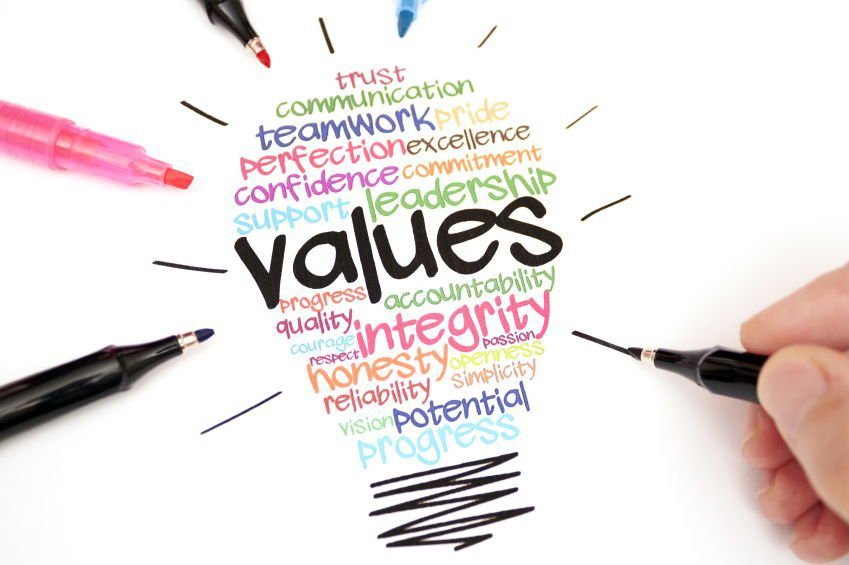Organizational Values: An organization is an artifact, social entity, has structured activities, nominal boundaries and it is goal-directed. The Concept of Organizational Values: Definition of Organizational Values, Sources of Organizational Values, Advantages of Organizational Values, and Disadvantages of Organizational Values! Influence of Organizational Values on Organizational Practices and Processes. Values can explain in a few perspectives according to various sources.
Learn, Explain Organizational Values: Definition, Sources, Advantages, and Disadvantages!
In ethics, the value represents the importance of physical and abstract objects which is ideally accepted by individual or group. It can also define as qualities that are considering worthwhile that represent an individual’s highest priorities and deeply held driving forces. Values are often admixture with knowledge, norms, and beliefs. Also learned, What are the Participation and Organizational Climate? Organizational Values: Definition, Sources, Advantages, and Disadvantages!
Beliefs can prove right or wrong by one but not values. Beliefs may vary by cohort, time, geographical differences but values are universal, true for anybody at any time, whenever an individual is. Organizational values are ethical codes that guide behavior by putting assumptions into practice. It also serves as qualities that an organization appreciates and would require members of the organization to chase after.
Organizational values are the ideology of an organization and practiced by the organization from the employee treatment, technology development, customer or any other external environment interaction. It is part of the important element that forms an organization’s culture and it emanates deep from an organization’s soul.
Source and Origin of Organizational Values:
Organizational values are closely associated with human values. It can perceive as an extension of human values, which can categorize into two: instrumental and terminal value. Positive, honest, integrity, responsible, helping the needful are some examples of values. Terminal value relate to goals or desired stage, whereas instrumental values relate to what needs to apply to achieve a terminal value. Example: one’s terminal value being to provide a good life to family members, and instrumental value being to be hardworking and responsible in everything aspects.
Organization values that contradict with human values will leave the members of the organization uncertain and confused about their roles. Problems that plague the society will mirror in the organization. Values do not come from conscious intentions but rather, from the highest expression out of the free will. Some organizational values are not consciously created but are part of the fabric of the organization, as a result of founders’ views.
Values might discover and practice by founders during the early days. Values remain unchanged but evolved over the years unnoticeably until the organization decided to encapsulate it in words and lay as a fundamental part of the way the organization thinks.
Extra knowledge:
Some organizational values are creating consciously by the management team who decide to improve company’s performance systematically. Frameworks, methods might introduce to capture the organizational values to reveal findings. Values could derive from the organization’s goals. It is a set of principles that guide an organization to success and through difficult situations. It is not to compromise for short-term expediency or financial gain.
Organizational values are so special that it superseded corporate strategy, technological advantages or market presence to be the power that resides in shaping a successful organization. Organizational values define the acceptable standards which govern the behavior of individuals within the organization. Without such values, individuals will pursue behaviors that are in sync with their value systems, which may lead to behaviors that the organization doesn’t wish to encourage.
Advantages of Organizational Values:
Organizational values promote the healthy growth of an organization. According to Maslow’s hierarchy of needs, humans have a fundamental need to associate with something that they can feel proud. With the tight association, all members have with an organization, the individual’s membership defines and subsequently creates a committed workforce.
Organizational values also let members of the organizations stay motivated. The external motivation by managers is less effective than in a routine-based society and work process. Therefore organizational values should take into consideration to promote intrinsic motivation of the organization’s members.
The nature, role, and function of values are considering a central part of the organizational value foundation of a corporate brand. Organizations with good organizational values perceived as socially responsible corporate and generally well accepted by the public. Brand value increase and therefore drive good returns from the public, in terms of sales, as well as brand image. Organization identity is strong and helps differentiate the organization from competitors.
Organizational values are vital for continuity, consistency, and credibility in a value-creating process. As values ensure everyone in the organization is working towards the same goals by the same principles and adhering to the same standards. Organizational values foster the organization’s morale and protect an organization’s reputation. Values are cognitive, affective and provide directions. It drives organization groups towards the common target.
Disadvantages of Organizational Values:
Values are important to study organizational behavior because the value is the foundation of how people behave. Personal values might contradict with organizational values although values are typically good. Example some organizations’ reward system is based on seniority. People that value performance higher than seniority will tend to need to deal with disappointment when they are bounding by the reward system based on seniority.
Both seniority and performance are good values but in this case, people disappoint due to different value hierarchy. When there is a contradiction, the individual could either place personal values as a top priority against the organizational value and vice versa. When individual prioritized personal values, organizations’ benefits are at risk of sacrifice. Individuals might feel depressed as well when organizational values took over personal values.
Individuals might suffer imbalanced life from practicing organizational values, such as ‘hardworking’ as organizational value and member of the organization might require to practice it and slack in terms of personal life, which is not a good sign from society harmony point of view.
Organizational value somehow define organizations’ goals to a certain extent. It might limit the organization’s pursuit of other achievable goals due to principles and standards generated by the defined organizational values.
Organizational value makes an organization harder to change their existing reputation if an organization decided to change the public’s perception that has long formed. It makes a reputable organization’s journey to a breakthrough existing image, a hard one.
Influence of Organizational Values on Organizational Practices and Processes:
Personal values shape individuals’ attitude and impact an individual’s behavior. Similarly, organizational value also influences how an organization ‘behaves’ because it will then determine the destiny of that organization.
Organization Practices and Processes are then set up, to follow. Serve as guidebooks to ensure the organization is pursuing the right path towards common goals on a day to day execution perspective. These practices and processes served as written controls and guidelines for members of an organization to perform. Their day to day job to achieve common organizational goals.
Business processes are set of living documents although. There should not be frequent changes to review from time to time. Some organizations spend a huge amount of investment to review and redesign processes. The design teams tend to be ambitious to design processes that ‘work on paper’. Issues arise during the execution phase. Situations become more complicated if staffs are not governed by organizational value’s. Policies and practices are as good as the human that man many subsystems and sub-processes.
An organization can have the best-designed processes but still cannot be a world-class organization if humans. As part of the key factor is not behaving how they should be. Other than processes, policies, and practices also include organizational enablers. An enabler is a technical facility or resource that makes it possible to perform a task, activity or processes. Organizational value also influences the organizational enablers directly which consequently impact the organization’s policies and practices.
More read it:
Typical business processes involved in an invoice and servicing customers include billing the customer. Provide after-sales service and responding to customer inquiries. If an organization induce “trust and personal responsibility to every client’s success”. As an organizational value and this is being practiced across the organization including the invoice department. It is almost certain that customers will receive superb customer services and that organization can expect regular return customers without much of marketing effort. But if the invoice department does not practice the organizational value. It is most likely to be the pain point for customers to deal with, and the staffs do not feel their responsibility towards the organization’s success.
If an organization is sales-Oriente and take customers as the highest priority. The internal policies making would also align to support the organization’s values. This direction does not only apply to external customers but will also determine inter-departmental interaction mode. One department becomes another department’s internal clients and staffs take cross-departmental interaction seriously instead of having a bureaucracy attitude.
By Research;
World-famous technology leader, Sony’s core values are to be a leader, not the follower. The organizational value has been driving the company to be notable as the ‘first’ to introduce cutting-edge electronic devices, recording, and storage technologies to market all time. Sony refuses to stay in the position of adopting standards of other manufacturers set.
Sony spends millions of dollars in the Research and Development Department every year to sustain as the leader in new product introduction. ‘Walkman’ is a Sony brand trademark originally uses for the portable cassette player. It was invented by Sony’s audio division engineer Nobutoshi Kihara in 1979 and other electronic companies then followed the idea, innovatively. Sony also was the first to launch other electronic products such as Compact Disc players, gaming console, Play Station to name a few.







Leave a Reply